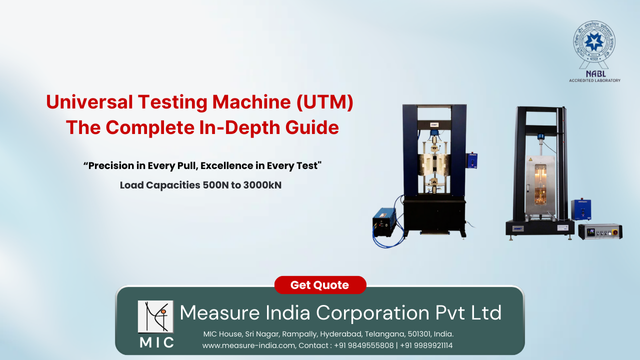
Universal Testing Machine (UTM) – The Complete In-Depth Guide

Materials used in construction, automotive, aerospace, and various industries need to be tested for strength, durability, flexibility, and failure limits. Without proper testing, a building might collapse, a car’s safety parts may fail, or an aircraft component might not withstand pressure differences.
That’s why industries rely on the Universal Testing Machine (UTM)—a versatile, high-precision equipment that determines the mechanical properties of materials through different test methods.
A Universal Testing Machine (UTM) is an advanced mechanical testing device used for evaluating material strength. It can apply controlled tensile, compressive, bending, and shear forces on test specimens and measure their response.
Because it can perform multiple types of tests on different materials like metals, plastics, concrete, textiles, rubber, and composites.
Ultimate tensile strength (UTS) – The maximum stress a material can withstand before breaking.
Yield strength – The stress level at which a material permanently deforms.
Young’s modulus – The elasticity of a material.
Elongation & ductility – The ability of a material to stretch before failure.
Compressive strength – The ability of a material to resist crushing forces.
Bend & shear resistance – The ability of a material to resist bending or shearing forces.
These mechanical properties help industries design better products, ensure quality control, and improve safety standards.
The material sample is cut into a standardized shape and size as per testing norms (ISO, ASTM, BIS).
It is placed between grips or fixtures depending on the type of test.
The operator selects the required test mode (Tensile, Compression, Bending, etc.).
The crosshead and load cell are calibrated to apply the required force range.
The machine starts applying force gradually and precisely.
The force is either applied through a hydraulic or electromechanical system.
The specimen deforms under load, and real-time data is collected.
The system records stress-strain curves, load vs. displacement graphs, and failure points.
The software generates a detailed report with material properties.
The results are compared with industry standards to determine material suitability.
The data is used in product design, quality assurance, and failure analysis.
Uses hydraulic pressure to apply force.
Suitable for high-strength materials like steel, concrete, and aerospace components.
Common in construction, defense, and automotive industries.
Offers higher force capacity (up to 2000 kN).
Uses a motor-driven screw system to apply force.
Best for low to medium load testing (plastics, textiles, polymers, rubber).
Ideal for R&D, material development, and educational institutes.
Offers high accuracy & automated testing options.
Example: Imagine pulling a rubber band. If you keep pulling, it stretches until it finally snaps. This is exactly what happens in a tensile test.
Example: If you press a sponge, it deforms. If you press a brick, it stays rigid. Compression tests check how much a material can withstand pressure.
Example: Think of a wooden scale—if you press on its center, it bends slightly before breaking.
Example: When using scissors to cut paper, you’re applying a shear force.
Load Frame – The structural body that holds all components.
Crosshead – Moves up/down to apply force on the specimen.
Load Cell – Measures the force applied with high precision.
Grips & Fixtures – Hold different test specimens securely.
Actuator (Hydraulic/Electromechanical) – The force application mechanism.
Software & Display Unit – Captures real-time data, plots graphs, and generates reports.
Construction – Tests steel, concrete, and structural materials for buildings & bridges.
Automotive – Ensures safety parts like airbags, seatbelts, and body panels meet durability standards.
Aerospace – Validates aircraft components for extreme conditions.
Biomedical – Checks medical implants, prosthetics, and surgical equipment.
Packaging & Polymers – Verifies the strength of plastic bottles, films, and containers.
Defense & Military – Tests armor plates and bulletproof materials for battlefield use.
Highly Versatile – Performs multiple tests on various materials.
Accurate & Reliable – Provides precise force measurements.
Automated Analysis – Generates real-time data reports.
Ensures Safety & Compliance – Meets global standards like ISO, ASTM, BIS.
Cost-Effective – Reduces material wastage and enhances product design.
A Universal Testing Machine (UTM) is an essential tool in material testing, ensuring that metals, plastics, and composites meet strength and durability requirements. Whether it’s a bridge, car, or aircraft, UTM testing plays a crucial role in product safety and reliability.
Looking for a high-quality Universal Testing Machine? Contact Measure India Corporation Pvt. Ltd. for expert solutions!
Mechanical testing Machines in Hyderabad
NABL accredited mechanical testing machines in India
Tensile testing machines & lab near me
Impact testing machines & services in Chennai
Material testing machines & lab in Bangalore
For trusted and accurate mechanical testing machines & services, contact us today! Our experts are ready to assist with testing, analysis, and compliance solutions tailored to your needs.
Office Address : Universal Testing Machine Supplier in India
MIC House, Sree Nagar, Ram pally,
Hyderabad – 501301, Telangana, India
Website: www.measure-india.com
Phone: +91-9989921114
Email: info@measure-india.com